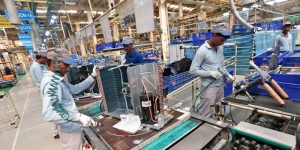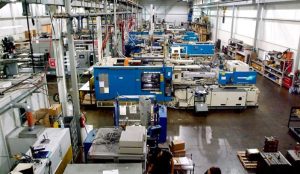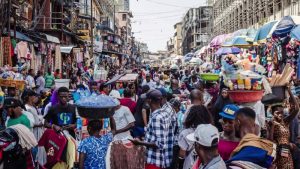Nigeria’s Growth Must Go Beyond GDP to Create Jobs and Human Competitiveness

As the cost of living squeezes families across Nigeria, with rising food prices, unemployment and the naira’s continued depreciation, experts are increasingly asking: what does GROWTH really mean for the average Nigerian household?
Dr. Tayo Aduloju, Chief Executive Officer of the Nigerian Economic Summit Group (NESG), clarifies that Nigeria’s pursuit of economic expansion must shift focus from numbers to people. In an interview with Arise News ahead of the 31st Nigerian Economic Summit, themed “A Reform Imperative: Building a Prosperous and Inclusive Nigeria by 2030,” Aduloju argued that gross domestic product (GDP) growth alone cannot guarantee national prosperity or family well-being.

“When people talk about a growing economy, they usually refer to GDP size or growth rates,” Aduloju said. “But true growth has depth. It’s about diversification, technology and inclusion. It must touch lives, not just balance sheets.”
Nigeria’s GDP has grown intermittently over the past decade, driven largely by oil and services. Yet, unemployment remains high, with the informal sector still accounting for a large share of jobs. For many families, economic “growth” has not translated into improved living standards.
Aduloju believes the conversation must evolve. He outlines five pillars that the 2025 summit will focus on: industrialisation, investment, institutional strengthening, inclusion, and trade competitiveness. Each, he said, is essential to shifting Nigeria from a commodity-dependent economy to one that empowers citizens through productivity and innovation. Nigeria’s vast arable land and mineral resources remain underutilised. Aduloju painted a stark picture of waste and missed opportunities:


“We can’t keep wasting tomato harvests in Katsina, exporting crude oil and importing refined products, or losing 70% of vegetables post-harvest while under-cultivating 60% of our arable land,” he said. “Industrialisation means transforming what we have into competitive advantage, producing complex but value-added goods.”
This push for industrialisation, he argued, is not merely an economic necessity but a social one. Families in rural communities, where post-harvest losses are common, bear the brunt of inefficiencies. A stronger agro-industrial base could stabilize incomes, reduce migration pressure on cities, and create sustainable jobs for young people.
Beyond factories and farms, Aduloju said the real test of reform will be attracting and retaining investment. Nigeria, he estimates, needs $10–15 billion annually for the next five years to reach the government’s target of a $1 trillion economy.
“Big money goes where it’s treated well,” he said, emphasizing that investor confidence depends on regulatory stability, contract enforcement, and transparent governance. “If you mistreat domestic investors, foreigners will stay away. Economic transformation begins when national assets yield productivity, not when they sit idle.”


His comments come amid Nigeria’s ongoing struggles to attract foreign direct investment, which fell sharply in recent years due to policy inconsistency and infrastructure bottlenecks.
A major theme of Aduloju’s message is inclusion. Ensuring that growth creates jobs, reduces poverty, and narrows inequality. “You don’t achieve inclusion by simply carrying people along,” he said. “You achieve it when growth creates opportunities that lift families out of poverty.”
In many Nigerian homes, economic pressure has become intergenerational. Parents watch their children graduate into unemployment. Women-led businesses, which form the backbone of the informal economy, often operate without access to credit or reliable power.
“We once had double-digit GDP growth driven by oil, but it was jobless growth,” Aduloju said. “We were growing but exporting jobs because local capacity wasn’t being built.” That, he said, must change. A reform-driven Nigeria should channel growth into industries that employ its people; from manufacturing to digital services, while strengthening social safety nets.
In preparing for the summit, the NESG plans to engage with nations like Mexico and Indonesia. These are countries that have successfully transitioned from resource dependence to diversified, export-led economies.
“Countries don’t compete globally; businesses do,” Aduloju noted. “Your Dangotes, your Innosons, etc., they are the ones competing out there. If you kill them at home, you lose globally.”
He cited the telecommunications revolution as a model for transformative policy. In just two decades, Nigeria moved from less than 1% tele-density to near-universal mobile access proof. This he said, that reform and regulatory clarity can unlock new industries.

Ultimately, Aduloju’s message returns to the human dimension: growth that fails to create jobs is unsustainable. “Jobless growth means you’re exporting jobs,” he warned. “Real reform must ensure that every phase of Nigeria’s growth creates value and opportunities for its people.”
As Nigeria prepares for the 31st Economic Summit, the stakes are high. For policymakers, the challenge is to design reforms that translate into food on the table, stable power for small businesses, and dignified work for millions of young Nigerians. For families, it’s about seeing the numbers on paper finally reflected in better living conditions.
Because in the end, as Aduloju reminds us, the true measure of economic success is not how fast the economy grows, but how well its people live.






